The X-Men, cursed heroes for an increasingly polarized world
The premiere of ‘Deadpool & Wolverine’ — the latest in a groundbreaking period of films and shows based on the Marvel Comics — and a new video game have amplified the relevance of the X-Men and their eternal fight against intolerance
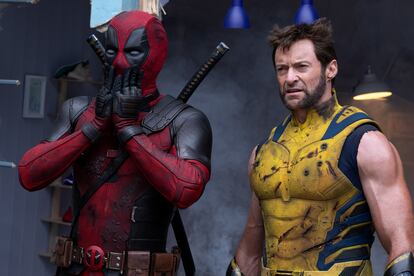
Superheroes have a complicated job: endless work days, with hardly any breaks, in very high-risk contexts, and all without a salary. Of course, in return, luck has given them enormous power, while the gratitude of citizens — who they save time and time again — must also be a kind of compensation. The X-Men, however, don’t even have that. On the contrary: humanity despises them.
“Feared and hated by the world they have sworn to protect” is the motto that has accompanied the mutants during their six decades of life. They were, simply, born different, and that’s why typical people reject them. This will sound familiar to any member of a marginalized group. “Their most important enemy is intolerance,” summarizes Alejandro Martínez, the editor of Panini Cómics, which publishes works by Marvel in Spain.
When Stan Lee and Jack Kirby created the X-Men, in September 1963, they may have been way ahead of the times. While there’s more solidarity today, at the same time, new threats are — once again — putting up walls and creating ghettos. Progress has put the spotlight back on the X-Men. Of course, their recent resurgence also has to do with cinema, creative risks (or their absence), video games and nostalgia. In this moment, the mutants are savoring precisely what they never received in their original plots: the adoration of the masses.
Hordes of worshipers are expected to flood theaters for Deadpool & Wolverine, which opened in the U.S. on Friday, July 26. In addition to their standard missions, the two mutants — perhaps the most peculiar of the bunch — are also entrusted with the task of attempting to rescue the cinemas themselves and to demonstrate to Disney (which owns Marvel) that the X-Men still have a future on the big screen. Meanwhile, on the small screen, the X-Men have taken the world by storm, via the animated series X-Men ‘97, which streams on Disney+.
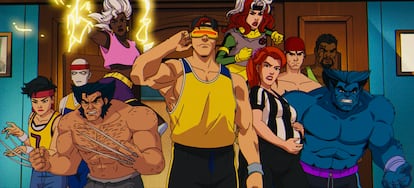
The film has also been accompanied by the umpteenth revolution in comics. After the groundbreaking Krakoan Age (2019-2024) — a series of X-Men storylines that received both acclaim and harsh criticism — a new era suggests a return to the basic essence of the franchise. From the Ashes is the name of the 2024 relaunch. And, while leaks of the Wolverine video game have exasperated Insomniac Games, this has only increased the expectations for the 2025 release.
For Reed Tucker — author of Slugfest: Inside the Epic, 50-year Battle between Marvel and DC (2017) — the X-Men act as “a metaphor for discrimination, [which] plays a key role in almost all of their stories. It’s always been Marvel’s most overtly political comic,” Tucker affirms. Already back in 2022, journalist Kwame Opam, in an article for The New York Times, wrote about how “a community of X-Men fans — notably young, self-identified queer people of color — is growing around podcasts and on social platforms, including Twitter, TikTok and Discord.”
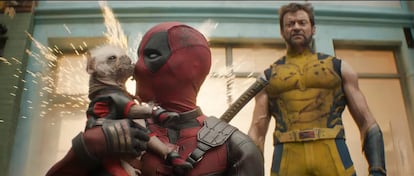
The mutants have had other moments of glory… and oblivion. This can happen to anyone who reaches retirement age. But the X-Men have no plans to retire. They were born in the same period as other Marvel legends, from Spider-Man to The Fantastic Four. At the Xavier Institute — a mansion in Westchester County, New York — Professor Charles Xavier worked with his five original students: Cyclops, Jean Grey, Beast, Angel and Iceman. The clash between mutants and humans was an issue from the beginning, alongside an eternal debate that placed the founder of the X-Men in opposition to Magneto, who is both his friend and nemesis. They’ve long fought over the mutants either integrating into humanity — despite the hatred they receive — or subjugating it.
Poor sales, however, cornered the mutants. “It was going so badly that, a few years after [the series was introduced], the original production was halted. There were only a few reprints. [The X-Men] didn’t really have an impact on popular culture until the mid-1970s,” Tucker clarifies. By then, more students had already arrived at Professor Xavier’s institute. And they didn’t just come from the United States: Wolverine came from Canada, Storm remembered his childhood in Kenya, Nightcrawler blurted out a few words in German and Colossus spoke Russian. Gambit hailed from the Cajun ethnic group, while Thunderbird — a descendant of the Apache — gave voice to the most unheard community in the Americas: the Indigenous people. At least, for a handful of issues, until he passed away.
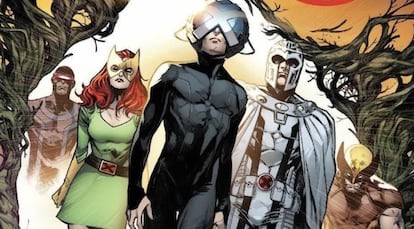
A key addition to the fate of the characters emerged in the form of Chris Claremont. Not a mutant, but a screenwriter who elevated the X-Men, alongside artists such as Dave Cockrum or John Byrne. “Their struggle isn’t simply to defeat the bad guys; it’s to establish themselves as credible, honorable fellow citizens of the planet,” the writer notes, in the appendix to Days of Future Past, one of his most famous storylines.
“All my life, I’ve seen people murdered for no other reason than the God they worship or the color of their skin… or the presence of an extra gene in their DNA,” is a line he had Magneto say in Mutant Genesis 2.0, another of his applauded works. Some of his other famous titles include The Dark Phoenix Saga, Excalibur, or God Love, Man Kills, among many others.
“The concept of the novel was clear: each episode was almost self-contained, but in some ways, it was part of a larger story. It gave the feeling of reading something transcendent. And [Claremont] also took care of each character,” editor Alejandro Martínez acknowledges.
Still, what probably mattered most to Marvel was income. After a rough start, X-Men became the company’s most successful series. X-Men 1 — from October 1991 — achieved the Guinness World Record for the best-selling comic book ever, with eight million copies sold.
The Claremont stage also hooked — among many others — Salvador Larroca. Years later, the Spaniard would have the “honor” of drawing plots by the screenwriter who had influenced him so much. He ended up becoming one of the most revered illustrators in the history of the characters. “I’ve been to signing sessions where people come up to me and tell me that reading those comics changed their lives at the time. Maybe they associate you — as a creator — with that revitalization. It’s very emotional,” the artist says.
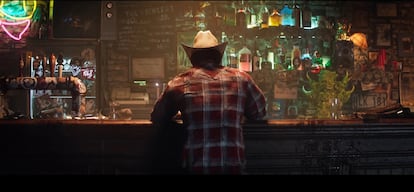
Another key artist involved in the X-Men, Pepe Larraz, highlights more superpowers associated with the mutant epic: “What makes a work of art good is that it has multiple interpretations, depending on the moment. When you’re a child, you’re amazed that Wolverine has claws. As an adult, you understand persecution, family, conflict versus peace, discrimination… That’s why the X-Men are so relevant. And I like that the characters — rather than being terribly bad — are, to a certain extent, understandable. It’s one of the comics in which morality is questioned the most.” Perhaps that’s also why the X-Men have generated so many conversations and controversies.
In the comic E is for Extinction, Grant Morrison wrote about the massacre of 16 million mutants, while Frank Quietely drew it. And so many other plots have discussed genocides and social Darwinism, while fiercely criticizing Catholicism (but also celebrating the heroes who practice it). The comics draw parallels to Martin Luther King, apartheid in South Africa, the transgender identity, as well as the different positions within feminism. In the 2003 film X-Men 2, Iceman’s parents ask him a question — “have you tried not being a mutant?” — which evokes the uncomfortable conversations that so many LGBTQ+ children have faced at home. The character ultimately came out of the closet in 2015.
Ann Nocenti, a legendary screenwriter and editor who was also in charge of the X-Men comics for a time, once raised a critical point: why did the public in the Marvel Comics despise Cyclops and company, but applaud the exploits of superheroes like the Human Torch or Black Widow? How could they know that the former were mutants?
She decided that the focus going forward should be different. “Their powers arrive during puberty, similar to the changes you go through in adolescence, whether they’re special, uncontrolled, or end up marginalizing you. It’s all about the issue of identity, of not fitting in.”
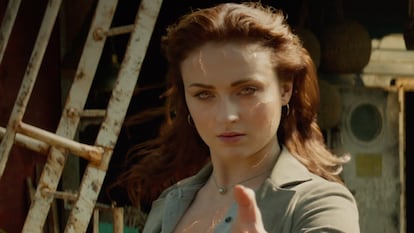
The recent Krakoan Age — written by Jonathan Hickman and drawn by Larraz — has been accused of turning the X-Men into supremacists, who lock themselves in their country and its privileges, all while blackmailing humanity. The Spaniard understands that attacks are the price for trying to innovate: “There’s the illusion of ‘change’ in Marvel. It seems like everything changes, but it never happens. In this case, it does.” Precisely because of the daring and uncomfortable dilemmas, Connor Goldsmith — creator of CEREBRO, a podcast about the X-Men — applauds the recent stage in the saga.
Instead of a full-on revolution, the X-Men ‘97 animated series proposed a reform. The usual themes would be kept to recover old followers — from the sentinel robots that massacre mutants, to the fights between Cyclops and Wolverine — but they would be embraced by some more modern ideas and political approaches (too “woke” for some). According to those interviewed by EL PAÍS, it was precisely the repetition — to the point of exhaustion — that ultimately sank earlier stages of the mutants.
Martínez recognizes that, at the end of the 1990s, the comics already had too many characters. About 130 have passed through the team at some point, which has also been joined by groups such as X-Force, or X-Factor. Many have had their own collection of solo comics. Wolverine or Xavier have died and returned, while Jean Gray has done so on more than one occasion. “There’s no group [of superheroes] that has incorporated more people. After 30 or 40 years telling stories about a character, it’s difficult to do something that hasn’t already been done. So, oftentimes, the screenwriter who takes on a series introduces new additions that allow them to give [the story] their own touch. And, from time to time, some have had to be killed off to reduce [the size of the team],” Larroca reflects. Like Larraz, however, he points out that Marvel tries to play it as safe as possible. “Nowadays, there’s too much interference and too many people controlling things. Before, whatever was important was decided on in creative meetings.”
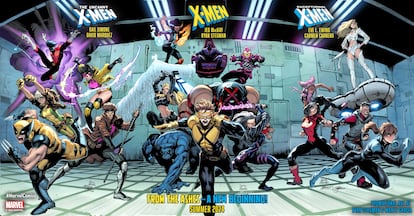
This explains why the X-Men films — after the success of the first ones in the early-2000s — multiplied to at least 15, between the main vein and the spin-offs. And it may explain why the latest installments — Apocalypse (2016) and Dark Phoenix (2019) — suffered critically and commercially. Corporate troubles have also worked against them: Marvel sold the rights to the characters to 20th Century Fox in 1994, hence they couldn’t appear in the Avengers movies that swept the entire planet.
Despite the successful adaptation of Days of Future Past and having stars like Michael Fassbender, Patrick Stewart and Jennifer Lawrence, the saga was deflating. While the movie theaters, toy stores and amusement parks were filled with Thor, Captain Marvel or Groot, the mutants — and The Fantastic Four — were once again left on the sidelines. For Martínez, in the end, it’s all about cycles: “We take it for granted that Iron Man is the most sought-after license behind Spider-Man. But when his first movie was released, he was a secondary Marvel character. There will be times when the X-Men are more or less fashionable, but they’ll always be present. I think of Hamlet, or Romeo and Juliet, the high-quality works that are part of the canon will never be forgotten.”
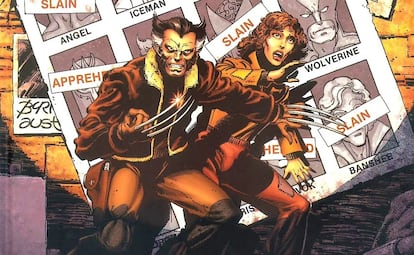
Sign up for our weekly newsletter to get more English-language news coverage from EL PAÍS USA Edition
Tu suscripción se está usando en otro dispositivo
¿Quieres añadir otro usuario a tu suscripción?
Si continúas leyendo en este dispositivo, no se podrá leer en el otro.
FlechaTu suscripción se está usando en otro dispositivo y solo puedes acceder a EL PAÍS desde un dispositivo a la vez.
Si quieres compartir tu cuenta, cambia tu suscripción a la modalidad Premium, así podrás añadir otro usuario. Cada uno accederá con su propia cuenta de email, lo que os permitirá personalizar vuestra experiencia en EL PAÍS.
¿Tienes una suscripción de empresa? Accede aquí para contratar más cuentas.
En el caso de no saber quién está usando tu cuenta, te recomendamos cambiar tu contraseña aquí.
Si decides continuar compartiendo tu cuenta, este mensaje se mostrará en tu dispositivo y en el de la otra persona que está usando tu cuenta de forma indefinida, afectando a tu experiencia de lectura. Puedes consultar aquí los términos y condiciones de la suscripción digital.









































